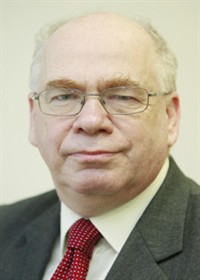Difference between revisions of "Lawrence David Freedman"
(→Affiliations) |
|||
| Line 18: | Line 18: | ||
==Affiliations== | ==Affiliations== | ||
*[[Iraq Inquiry]] | *[[Iraq Inquiry]] | ||
| − | |||
==Selected Papers== | ==Selected Papers== | ||
Revision as of 10:47, 3 August 2009
Sir Lawrence David Freedman is Professor of War Studies in the Department of War Studies at King's College London, a post he has held since 1982. He has recently been appointed Vice-Principal (Research) at King's. He was educated at Whitley Bay Grammar School and the Universities of Manchester, York and Oxford. Before joining King's he held research appointments at Nuffield College Oxford, IISS and the Royal Institute of International Affairs. He was elected a Fellow of the British Academy in 1995 and awarded the CBE in 1996, and is the Official Historian of the Falklands Campaign. He was awarded the KCMG in 2003.[1]
His area of academic expertise is nuclear strategy and the cold war, though he writes regularly on contemporary security issues.
Freedman has written extensively on nuclear strategy and the cold war, as well as commentating regularly on contemporary security issues. His publications include:
- Adelphi Paper, "The Revolution in Strategic Affairs"
- Deterrence (Themes for the 21st Century Series), Polity, 2004
- The History of Warfare: Cold War (Cassell, 2001)
- Strategic Coercion: Concepts and Cases (Oxford UP, 1998)
- Signals of War: The Falklands Conflict of 1982 (Princeton UP, 1991)
- a collection of essays on British defence policy and Kennedy's Wars that covers the major crises of the early 1960s over Berlin, Cuba and Vietnam.
Freedman is the Official Historian of the Falklands Campaign and author of The Official History of the Falklands Campaign (2 vols, Routledge, 2006).
Freedman's wife Judith is KPMG Professor of Taxation Law and a Fellow of Worcester College at Oxford University. They have two children, Sam and Ruth.
Affiliations
Selected Papers
- "The Special Relationship, then and now", Foreign Affairs, May/June 2006.
Notes
- ↑ Sir Lawrence Freedman, Oxford University Strategic Studies Group website, accessed 3 August 2009
